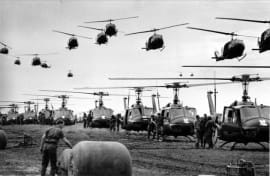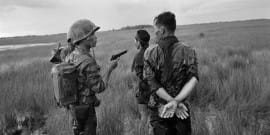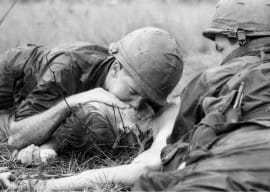Father and Son U.S. Army – Armor December 16, 2015
I was in Army ROTC at Dartmouth and was commissioned a Second Lieutenant, Armor, at graduation in 1964. I deferred my entry into the Army to attend business school, so I didn’t enter active service until the fall of 1966. By 1967, when my first assignment as a training officer at Fort Knox ended, the Vietnam War had really heated up and Second Year assignments were thrown into disarray. Consequently, I volunteered for Vietnam and was sent to Civil Affairs School and to Vietnamese Language School. To do this I had to extend my duty commitment by three months, but that all worked out well in the long run.

U.S. Army helicopters providing support for U.S. ground troops in January of 1966. (AP Photo/Henri Huet, File) .
I arrived in-country in December 1967, assigned to an advisory team of about 15, working with the provincial government and army in Go Cong Province, a rich, arable province about 35 miles south of Saigon in the Mekong Delta. I spent a year working with the local officials, supporting them in the construction and improvement of medical facilities, primary schools and local marketplaces. I spoke as much in French as Vietnamese because many of the educated Vietnamese had learned fluent French during the French colonial era.
In addition to my regular jobs, I was also able to meet with my father, an eye surgeon, 67 years old at the time, who had given up his practice in Baltimore for three months to serve in the regional Vietnamese hospital in Can Tho, the largest city in the Mekong Delta. At the time, he was the oldest doctor to volunteer to go to Vietnam, and won outstanding recognition for his service and his treatment of Vietnamese civilians with eye problems.
Things got a little tense for our team during the Tet attacks in 1968, but we did not experience the same major onslaughts as other areas saw. The province survived quite successfully, and I was convinced that the people there wanted nothing to do with North Vietnamese invasion or with Viet Cong sympathizers.

A South Vietnamese soldier holds a cocked pistol as he questions two suspected Viet Cong guerrillas, 1962 (AP Photo/Horst Faas).
I was quite sorry to leave Vietnam after the year. I found my tour in Go Cong significant and satisfying. I confess to being a lifelong, resolute anti-communist. My parents escaped Hungary just as Communism was taking hold in the late 1940s, so I have always known Communism to be the most repressive and suffocating form of government ever forced on people. And, in my view, there was no doubt that, at least in Go Cong, the population did not want this North Vietnamese invasion and did not support the Viet Cong cadres. The 1.5 million South Vietnamese refugees who got into boats and tried to flee Vietnam after the fall of Saigon seem to have borne that out. I believe that all Americans and I were sent to Vietnam to help the people of South Vietnam improve their lot, withstand the false promises of a communist dictatorship and keep their individual freedom. We went in to help South Vietnam fight off an invasion from the north and subjugation by a communist government

Medic James E. Callahan of Pittsfield, Mass., gives mouth-to-mouth resuscitation to a dying soldier in war zone D, about 50 miles northeast of Saigon, June 17, 1967 (AP Photo/Henri Huet).
I am sorry we were not able to do that, but, in the end, I think we accomplished a lot and Vietnam will get there someday. Communism of the 20th century did not want to have free societies at their borders. Had the Vietnam War not delayed and weakened the export of communism from China, I do believe that the neighboring dominoes would also have fallen. And now, I believe, the shortcomings and lies of communism are more obvious, and the tide of philosophy is turning back toward individual initiative, freedom and democracy. The societal progress China and Vietnam have been making in this century are due to the returning entrepreneurship and initiative of their citizens, and to the easing of control and tyranny of their governments.
One day, Vietnam will be a free society and, just as Leningrad again became St. Petersburg, so Ho Chi Min City will one day again become Saigon. Would that have eventually happened anyway–without intervention by the U.S. in the ’60s and ’70s–as it is slowly happening in China? Who knows. But, the US effort certainly didn’t hurt the cause of freedom, in Vietnam or in the rest of Asia.
Also read JAI director Tracy Metz’s introduction (December 2), editor Phillip C. Schaefer’s introduction (December 4), the essay by veteran Jim Harris (December 7), the essay by veteran Glen Kendall (December 9), the essay by Karl F. Winkler (December 14), the essay by veteran Carl DuRei (December 18), the essay by James Laughlin (December 21), the essay by John T. Lane (December 23), and the essay by Bud McGrath (December 27).